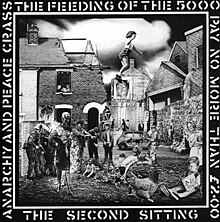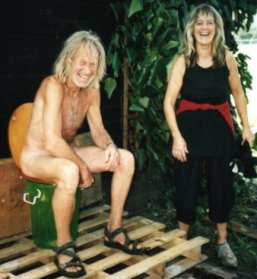
Gee Vaucher is a visual artist primarily associated with the anarcho-punk band Crass.

Stations of the Crass is the second album by Crass, released in 1979. The record, originally released as a double 12", includes live tracks from a gig recorded at the Pied Bull pub in Islington, London, on 7 August 1979. The first three sides contain the studio tracks and play at 45 rpm, while the final side comprises the live material and plays at 33 rpm. The album's title is not only a pun on the Catholic rite of the Stations of the Cross, but is also a reference to the graffiti campaign that the band had been conducting around London's underground railway system, the cover artwork depicting a wall at Bond Street tube station that had allegedly been 'decorated' by them. Although the album met mixed critical reception at first, it managed to sell at least 20,000 copies within two weeks.

Crass Records was an independent record label that was set up by the anarchist punk band Crass.

Yes Sir, I Will was the fifth and penultimate album released in March 1983 by anarcho-punk band Crass. The album is a virulent attack on then-Prime Minister of the United Kingdom Margaret Thatcher and her government in the aftermath of the Falklands War and was set nearly wholly over a raging and an almost free-form improvised backing provided by the group's musicians.

Steve Ignorant is a singer and artist.

Penny Lapsang Rimbaud is a writer, poet, philosopher, painter, musician and activist. He was a member of the performance art groups EXIT and Ceres Confusion, and in 1972 was co-founder of the Stonehenge Free Festival, together with Phil Russell aka Wally Hope. In 1977 with Steve Ignorant, he co-founded the seminal anarchist punk band Crass and served as its drummer. Crass disbanded in 1984. Until 2000 Rimbaud devoted himself almost entirely to writing, returning to the public platform in 2001 as a performance poet working with Australian saxophonist Louise Elliott and a wide variety of jazz musicians under the umbrella of Last Amendment.

Penis Envy, released in 1981, was the third LP by the anarchist punk band Crass. The album was included at #36 on Rolling Stone's "40 Greatest Punk Albums of All Time" list in 2016.

Christ – The Album is the fourth album by Crass, released in 1982. It was released as a boxed-set, double-vinyl LP package, including one disc of new studio material and another, entitled Well Forked.. But Not Dead, a live recording of the band's June 1981 gig at the 100 Club in London along with other studio tracks, demos and tape fragments. The box also included a book, A Series of Shock Slogans and Mindless Token Tantrums, and a large poster painted by Gee Vaucher. The album was well received and the band considered it their best.
EXIT were a performance art group during the mid-1970s. EXIT members Penny Rimbaud and Gee Vaucher later founded anarchist punk rock band Crass, adopting many of EXIT's experimental/multi media techniques into Crass' presentation.
Zounds are an English anarcho punk/post-punk band from Reading, Berkshire, formed in 1977. Originally they were part of the cassette culture movement, releasing material on the Fuck Off Records label, and were also involved in the squatting and free festival scene. The name of the band is derived from the old English minced oath "zounds", a contraction of "God's wounds", referring to the crucifixion wounds of Jesus Christ, formerly used as a mildly blasphemous oath.
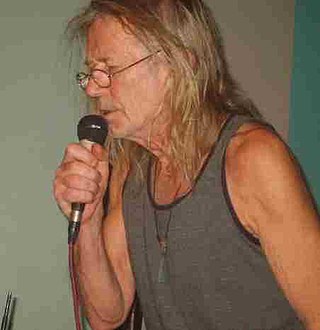
Last Amendment, formerly known as The Crass Collective and Crass Agenda, is the working title of a series of collaborations by ex-members of the anarcho-punk band Crass and others. Although Crass had formally split up in 1984, Penny Rimbaud, Gee Vaucher, Eve Libertine, Steve Ignorant, Andy Palmer and Pete Wright came together in November 2002 to put on a concert at the Queen Elizabeth Hall in opposition to the at that time proposed War on Iraq. Although they did not all appear on the stage at the same time, most of the ex-members of Crass participated in the event under the name of The Crass Collective, along with other performers such as Ian MacKaye, Goldblade, the English Chamber Choir, Fun Da Mental, and Nabil Shaban, among others.

Acts of Love is an album of 50 poems by Penny Rimbaud of the anarchist punk band Crass, set to classical music composed and arranged by Penny Rimbaud and Paul Ellis, and performed by Steve Ignorant and Eve Libertine. Released in 1985 on Crass Records, the record was accompanied by a book of 50 paintings by artist Gee Vaucher.
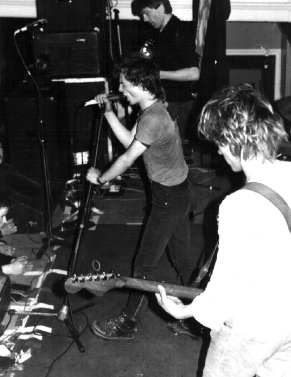
Flux of Pink Indians was an English punk rock band from Bishop's Stortford, Hertfordshire, active between 1980 and 1986.

Eve Libertine is an English singer.

Founded 1992 by John Loder, Southern Records is an independent record label. It is based in London and until 2008 had offices in the United States, France and Berlin.
John F. Loder was an English sound engineer, record producer and founder of Southern Studios, as well as a former member of EXIT and co-founder of the Southern Records distribution company with his wife Sue. He was also the studio engineer of choice for Crass and Crass Records, and was often considered to be the band's "ninth member".
This is an overview of the Crass Records discography. (NB, dates refer to initial UK releases, many of these records have since been re-issued in CD format)
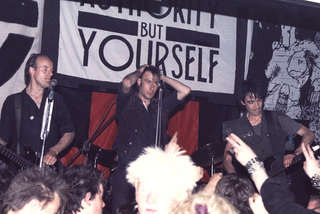
Crass were an English art collective and punk rock band formed in Epping, Essex in 1977 who promoted anarchism as a political ideology, a lifestyle and a resistance movement. Crass popularised the anarcho-punk movement of the punk subculture, advocating direct action, animal rights, feminism, anti-fascism and environmentalism. The band employed and advocated a DIY ethic in its albums, sound collages, leaflets and films.
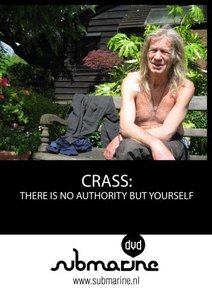
There is No Authority But Yourself is a Dutch film directed by Alexander Oey documenting the history of anarchist punk band Crass. The film features archive footage of the band and interviews with former members Steve Ignorant, Penny Rimbaud and Gee Vaucher. As well as reflecting on the band's past the film focusses on their current activities, and includes footage of Rimbaud performing with Last Amendment at the Vortex jazz club in Hackney, a compost toilet building workshop and a permaculture course held at Dial House in the spring of 2006.

This is Your Captain Speaking is a three-track EP by English musician Captain Sensible, released on 2 November 1981 on Crass Records. It was Sensible's first release as a solo artist, while still being a member of rock band the Damned. It reached No. 3 in the UK Indie Chart.
